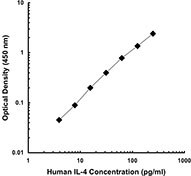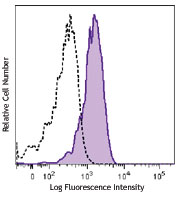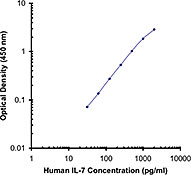- Clone
- BH1543 (See other available formats)
- Regulatory Status
- RUO
- Other Names
- Interleukin-15 (IL-15), MGC9721
- Isotype
- Mouse IgG1, κ
- Ave. Rating
- Submit a Review
- Product Citations
- publications
_100913.jpg&Width=240&Height=300&altFmImage_path=&Compression=90&Crop=5)
| Cat # | Size | Price | Quantity Check Availability | Save | ||
|---|---|---|---|---|---|---|
| 515103 | 50 µg | 100€ | ||||
| 515104 | 500 µg | 296€ | ||||
Interleukin-15 (IL-15) was discovered in supernatant from simian kidney epithelial cell line CV-1/EBNA, as a soluble factor capable of supporting proliferation of the IL-2-dependent cell line, CTLL-2 (1). IL-15 is a regulatory cytokine that is produced by dendritic cells, epithelial cells, human stromal cell line (IMTLH), fibroblasts, and monocytes (2). It plays an important role in immune response and shares many functions with IL-2, for example, it stimulates the proliferation of activated T cells (1, 2), NK cells (3) and B cells, and it induces immunoglobulin synthesis by B cells stimulated by anti-IgM or CD40 ligand (4). In addition, IL-15 promotes the development of dendritic cells (5), activates human neutrophils (6, 7) and induces the production of proinflammatory cytokines from macrophages (8). IL-15 acts as a bridge between innate and adaptive immunity because of its diverse roles in the immune system. IL-15 binds to heterotrimeric receptors composed of IL-15Rα, IL-15Rβ, and IL-15Rγc. IL-15 shares with IL-2 the receptor chains β and γc. IL-15 is normally not secreted in soluble form but is held on the cell surface bound to a unique receptor, IL-15Rα, especially on dendritic cells. Cell-bound IL-15 then is presented in trans to T cells and NK cells and is recognized by the γc receptor on these cells; such recognition maintains cell survival and intermittent proliferation (9).
Product DetailsProduct Details
- Verified Reactivity
- Human
- Antibody Type
- Monoclonal
- Host Species
- Mouse
- Immunogen
- E. coli - expressed, recombinant human IL-15
- Formulation
- Phosphate-buffered solution, pH 7.2, containing 0.09% sodium azide.
- Preparation
- The antibody was purified by affinity chromatography and conjugated with biotin under optimal conditions.
- Concentration
- 0.5 mg/ml
- Storage & Handling
- The antibody solution should be stored undiluted between 2°C and 8°C. Do not freeze.
- Application
-
ELISA Detection - Quality tested
- Recommended Usage
-
Each lot of this antibody is quality control tested by ELISA assay. For use as an ELISA detection antibody, a concentration range of 0.5-2.0 µg/ml is recommended. To obtain a linear standard curve, serial dilutions of IL-15 recombinant protein ranging from 500 to 7.8 pg/ml are recommended for each ELISA plate. It is recommended that the reagent be titrated for optimal performance for each application.
- Application Notes
-
The biotinylated BH1543 antibody is useful as a detection antibody for a sandwich ELISA assay, when used in conjunction with purified BH1509 (Cat. No. 515002) antibody as the capture antibody and recombinant human IL-15 (Cat. No. 570309) as the standard.
- Product Citations
-
- RRID
-
AB_2561320 (BioLegend Cat. No. 515103)
AB_2561321 (BioLegend Cat. No. 515104)
Antigen Details
- Structure
- 13 kD single non-glycosylated polypeptide
- Distribution
- T cells, B cells, dendritic cells, monocytes, and macrophages
- Function
- IL-15 stimulates the proliferation of activated T cells, NK cells, and B cells, inducing immunoglobulin synthesis by B cells stimulated by anti-IgM or CD40 ligand. In addition, IL-15 promotes the development of dendritic cells, activates human neutrophils, and induces the production of proinflammatory cytokines from macrophages.
- Interaction
- T lymphocytes, NK cells
- Ligand/Receptor
- IL-15Rα, IL-15Rβ and IL-15γc
- Cell Type
- T cells, B cells, Dendritic cells, Monocytes, Macrophages
- Biology Area
- Immunology, Innate Immunity
- Molecular Family
- Cytokines/Chemokines
- Antigen References
-
1. Grabstein K, et al. 1994. Science 264:965.
2. Ma A, et al. 2006. Annu. Rev. Immunol. 24:657.
3. Meresse B, et al. 2004. Immunity 21:357.
4. Armitage RJ, et al. 1995. J. Immunol. 154:483.
5. Pulendran B, et al. 2004. Eur. J. Immunol. 34:66.
6. Bouchard A, et al. 2004. J. Leuko. Biol. 75:893.
7. Ratthe C, et al. 2004. J. Leuko. Biol. 76:162.
8. Feng T, et al. 2008. Cell Immunol. 5:189.
9. Rubinstein MP, et al. 2006. P. Natl. Acad. Sci. USA 103:9166. - Gene ID
- 3600 View all products for this Gene ID
- UniProt
- View information about IL-15 on UniProt.org
Related FAQs
- How many biotin molecules are per antibody structure?
- We don't routinely measure the number of biotins with our antibody products but the number of biotin molecules range from 3-6 molecules per antibody.
Other Formats
View All IL-15 Reagents Request Custom Conjugation| Description | Clone | Applications |
|---|---|---|
| Biotin anti-human IL-15 | BH1543 | ELISA Detection |
Customers Also Purchased
_100913.jpg)

Compare Data Across All Formats
This data display is provided for general comparisons between formats.
Your actual data may vary due to variations in samples, target cells, instruments and their settings, staining conditions, and other factors.
If you need assistance with selecting the best format contact our expert technical support team.
 Login / Register
Login / Register 



_100913.jpg&Height=80&altFmImage_path=&Compression=90&Crop=5)







_100913.jpg&Width=150&altFmImage_path=&Crop=5)



Follow Us